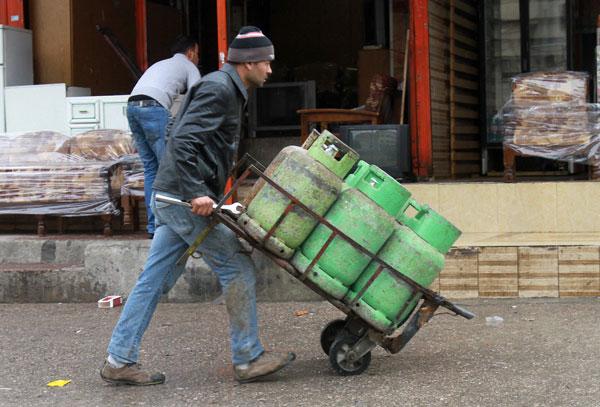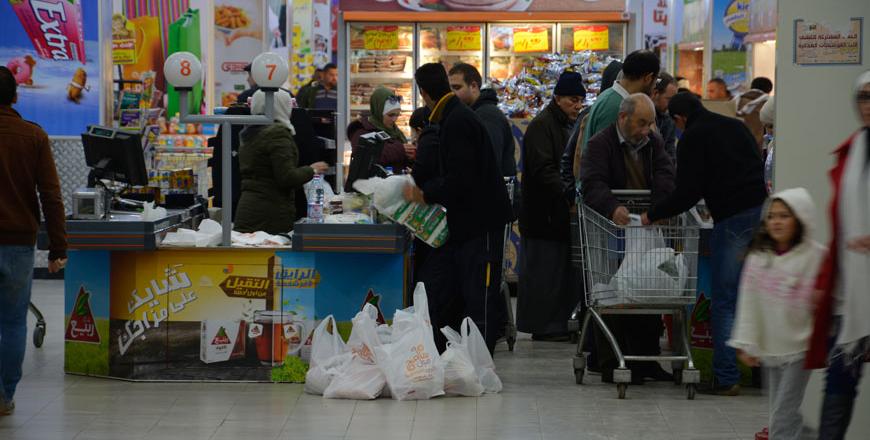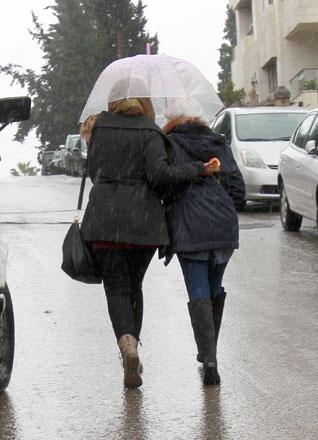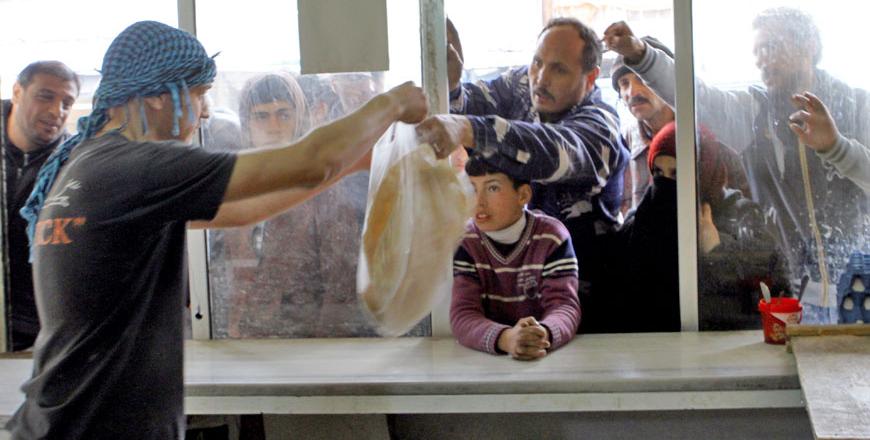You are here
Temperatures to dip nine degrees below average as snow, rain expected
By Hana Namrouqa - Jan 23,2016 - Last updated at Jan 23,2016

A worker pushes a cart filled with gas cylinders in a street in Amman on Saturday. Sales of gas cylinders, used for heating purposes, tend to rise substantially ahead of expected snowstorms (Photo by Hassan Tamimi)
AMMAN — The impact of a depression and cold polar front currently affecting Jordan is forecast to deepen on Sunday, when strong winds, heavy rain and snowfall are expected, according to the Jordan Meteorological Department (JMD).
The polar front and the depression, which will be centred over Syria by Sunday, will also cause temperatures to drop during this week 7OC-9OC below their annual average of 13ºC, while nighttime temperatures will dip below 0ºC, according to the department.
Heavy rain and thunderstorms are expected, especially in the northern and central regions, while snowfall on elevations of 1,000m above sea level is expected during the day, according to JMD forecaster Raed Rafed, who said that by nighttime snow will fall on areas 900m above sea level and higher., which includes most of west Amman.
Brisk westerly to northwesterly winds with speeds reaching 60-70 kilometres per hour are forecast, which will raise dust in the desert, the JMD said, and daytime temperatures will be 6ºC, dropping to 2ºC at night in Amman.
Colder polar winds are expected to blow on Monday, when temperatures will further drop during the day to 5ºC and to 0ºC at night in the capital, the JMD said, and the weather will be very cold, cloudy and rainy across the Kingdom, with northwesterly brisk and gusty winds.
"Snow is also expected to fall on areas located 800m above sea level. On Monday night, snow is likely to fall on areas located 700m above sea level as well," Rafed noted.
Another slight drop in temperatures is expected on Tuesday, when the weather will remain very cold, rainy and cloudy, the department said, adding that snow is expected to fall on elevations of 700m above sea level and higher.
Tlaa Al Ali, Rabiah, Jubeiha, Khalda, University of Jordan area, Dahiyat Al Rashid, Sweileh and Um Al Summaq are among the capital's areas located 1,000m above sea level.
Arjan, the Sports City area, Shmeisani, Dahiyat Al Amir Rashid, Um Uthainah, Jabal Hussein, Abdoun, Jabal Luweibdeh, Bayader, Sweifieh, Marj Al Hamam, Shafa Badran, Naour and Jabal Amman are all areas located between 800 and 1,000m above sea level, according to an unofficial chart.
Areas such as downtown, Jabal Al Jofeh, Jabal Al Taj, Marka, Al Hashemi Al Shamali, Al Hashemi Al Janoubi and Al Jizeh are located 700m above sea level.
Temperatures on Tuesday are expected to range between a high of 4ºC and a low of -1ºC in Amman, while winds will be northwesterly moderate to brisk.
"Temperatures on Wednesday will remain low during the day and below 0ºC at night in Amman. Snow and rain will gradually stop by Wednesday afternoon and ice formation due to low temperatures is expected across the Kingdom," Rafed told The Jordan Times.
The JMD issued several weather-related warnings for this week, including flood formation in low-lying areas, strong winds, accumulating snow, reduced road visibility due to heavy rain and snow, slippery roads and freezing temperatures.
With the JMD forecasting sub-zero temperatures at night during the polar front, the Jordan Water Company (Miyahuna) called on its subscribers to insulate their water meters to protect them.
In a statement e-mailed to The Jordan Times, Miyahuna said that subscribers will incur the repair costs if their meters are damaged, calling on subscribers in Amman, Zarqa and Madaba to wrap their water gauges with burlap or a piece of cloth to protect them from damage, while any exposed water pipes should also be covered with burlap or rock wool to prevent freezing temperatures from damaging them.
Meanwhile, the Ministry of Agriculture issued on Saturday instructions to farmers, cattle breeders and owners of fisheries and poultry farms to avoid losses due to freezing temperatures.
"Farmers are required to take precautionary measures to minimise the impact of the cold weather on their crops during snow and freezing temperatures," the ministry's spokesperson, Nimer Haddadin, told The Jordan Times.
Farmers should warm up greenhouses during the day and close them at night to preserve the heat, Haddadin said, adding that when temperatures dip to around 0ºC, farmers should also burn dry grass near the crops and slightly water them to mitigate the impact of frost and freezing temperatures.
Cattle breeders are urged to visit the ministry's directorates and veterinary clinics to receive vaccines and instructions; to keep newborn animals inside the barns; and to secure water and fodder there as well. Owners of poultry farms are requested to set the temperatures inside the barracks and regulate the feeding of the chickens.
Related Articles
AMMAN — The magnitude of a depression and a cold polar front forecast to affect the country on Saturday will be weaker than what was announc
AMMAN — With colder polar winds expected to prevail on Monday, bringing heavy rain, hail and snow, the Greater Amman Municipality (GAM) has
AMMAN — The impact of a depression and cold polar front currently affecting Jordan is forecast to deepen on Sunday, when strong winds, heavy

















